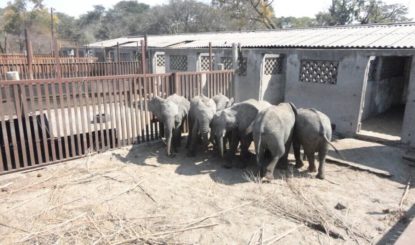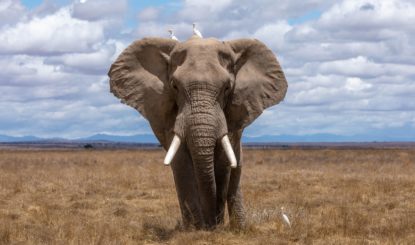Media release: Live elephants will no longer be exported from Africa – except «in exceptional circumstances»
The export of live wild-caught elephants from Zimbabwe and Botswana to zoos and circuses beyond the African elephant range has, until now, been legal under international law. The Parties at the 18th Conference of the Parties (CoP 18) of CITES (Convention on International Trade in Endangered Species of Wild Fauna and Flora) voted last Sunday 17 August to finally end this trade. For Fondation Franz Weber (FFW), an organization that has been at the forefront of the protection of elephants for the past 40 years, this decision is a huge advance towards the well-being of African elephants.
Geneva – The European Union (EU), after voicing its rejection of the proposal, failed on Sunday 17 August to cast its 28-member vote because not all its members had been credentialed. Had they cast their bloc of 28 votes, the proposal would not have passed by the required two-thirds majority.
Under the rules of the Convention, however, the EU was permitted to call for a re-vote in the COP plenary session.
That re-vote took place today and, against expectations, the EU reversed its original rejection of the proposal to ban trade in live African elephants. This occurred after a behind-the-scenes compromise was reached between the EU delegation and the African Elephant Coalition (AEC), a group of 32 African elephant range states. Following intense negotiation, the AEC, in the spirit of diplomacy and cooperation, agreed to concede to a minor addition to the text – that elephants may be exported beyond their natural range only «…in exceptional circumstances».
Even with this compromise, the outcome is a major step forward for the welfare of African elephants.
Widespread public opinion weighed heavily in determining the result. A letter sent by several public figures, including Pamela Anderson, Brigitte Bardot, and Ricky Gervais to EU Commission President Jean-Claude Juncker, called on the EU not to reopen the debate and change its position to accept the AEC proposal. Under mounting pressure, Brussels reacted quickly, and made contact with members of the AEC to seek a solution to the situation.
Diplomacy at CITES involves making compromises, but in this instance it was the powerful EU bloc that conceded the most ground.
The zoo industry will no longer be able to import wild-caught African elephants from Africa to their facilities in the United States, China, and many other countries outside the natural habitat of the species.
Fondation Franz Weber is thrilled with the result as it clearly demonstrates a fundamental shift in public opinion has forced the EU’s hand.
«People no longer want to see African elephants locked up alone and depressed in zoos,» says Vera Weber, President of FFW. «They want elephants to be protected in their natural environment. Times have changed and zoos will have to adapt. The EU’s momentous change of heart means that more than 30 baby elephants in captivity in Zimbabwe cannot now be exported to China. For that we are immensely grateful.»
Further information
Project page: End trading in endangered species!
Infoflyer CITES Proposals elephants: English, French



